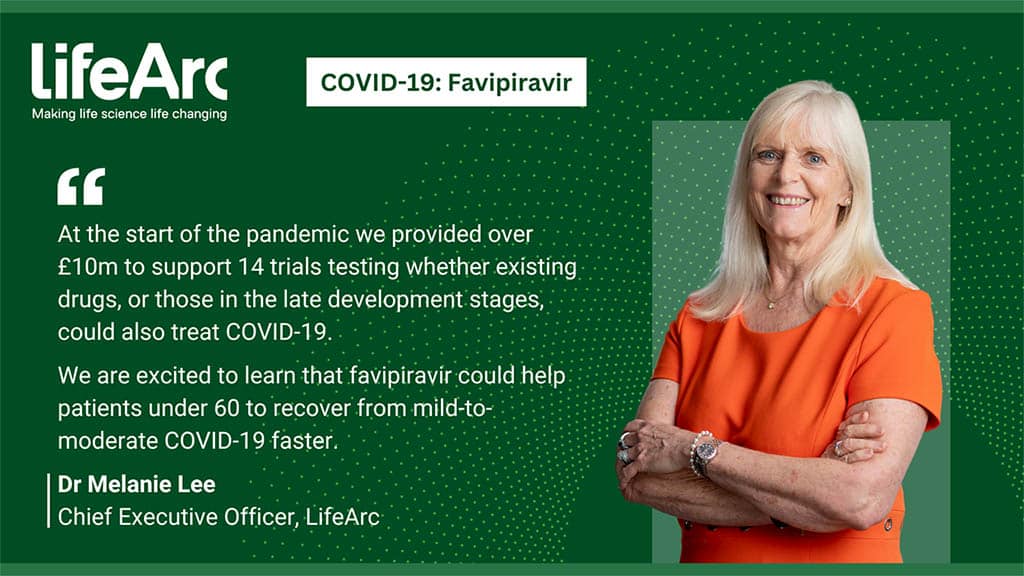A flu medicine called favipiravir could help people under 60 recover more quickly from COVID-19, according to an international drug repurposing study co-funded by LifeArc.
The results of the international PIONEER study show that patients under 60 years of age with mild to moderate COVID-19 may benefit from receiving this antiviral medication after they are admitted to hospital.
The findings are published today in The Lancet Respiratory Medicine – the world-leading respiratory medicine and critical care journal.
The study was supported by LifeArc through our £10 million funding call to repurpose existing medicines at the start of the pandemic, as existing medicines could offer a faster route to treating COVID-19 patients at a critical time.
Accelerating recovery
The PIONEER study began in 2020 and recruited 502 hospitalised patients across Europe and Latin America with suspected or confirmed early-stage COVID-19. The participants were randomly assigned into two groups – either receiving standard care plus favipiravir for ten days, or standard care alone.
The researchers compared how long it took for patients in each treatment group to show sustained clinical signs of recovery up to 28 days after joining the study. When comparing data from participants across whole the age spectrum, they found no significant differences in the rates of recovery between the two groups. But in a detailed breakdown of the data carried out after the study had been completed, they identified that patients under 60 years of age who received favipiravir had a slightly faster rate of recovery than those receiving standard care alone. However, the medication was not effective in people over 60.
Favipiravir is an antiviral drug that blocks an enzyme needed for viral replication in human cells. It has been licensed in Japan since 2014 to treat influenza. This viral enzyme is common to several viruses, including SARS-CoV-2, which causes COVID-19.
Dr Melanie Lee, Chief Executive of LifeArc, added: “At the start of the pandemic we provided over £10 million to support trials testing whether existing drugs, or those in the late development stages, could also treat COVID-19. Existing drugs offered a faster route to treating COVID-19 patients at a critical time.
“We are excited to learn that favipiravir could help patients under 60 to recover from mild to moderate COVID-19, faster. It’s equally important to know that it doesn’t work in people over 60, so they won’t receive this drug unnecessarily.”

Shaping treatment
The results of the study, which is the largest of its type involving favipiravir, may have important implications for the future use of this antiviral medication in COVID-19 patients around the world.
Professor Pallav Shah, the global chief investigator and principal investigator for the UK arm of the trial at Chelsea and Westminster Hospital NHS Foundation Trust, said: “I am delighted that this research has been published in The Lancet Respiratory Medicine journal, recognising that it was conducted in difficult circumstances at the start of the pandemic, across four countries.
The merits of methodical research before the widespread implementation of treatments is clearly demonstrated. Favipiravir is extensively used in several countries, but our work questions whether it has any effect at the current dose in the treatment of coronavirus infection, and especially in people over the age of 60 years.”
The PIONEER study was led by Chelsea and Westminster Hospital NHS Foundation Trust and supported by its official charity CW+, and NEAT ID, and was funded by LifeArc.
The study was performed in the UK at the Chelsea and Westminster Hospital, Royal Brompton and Harefield hospitals, Imperial College and Hull Hospital, and in Latin America by units in Brazil and Mexico.



